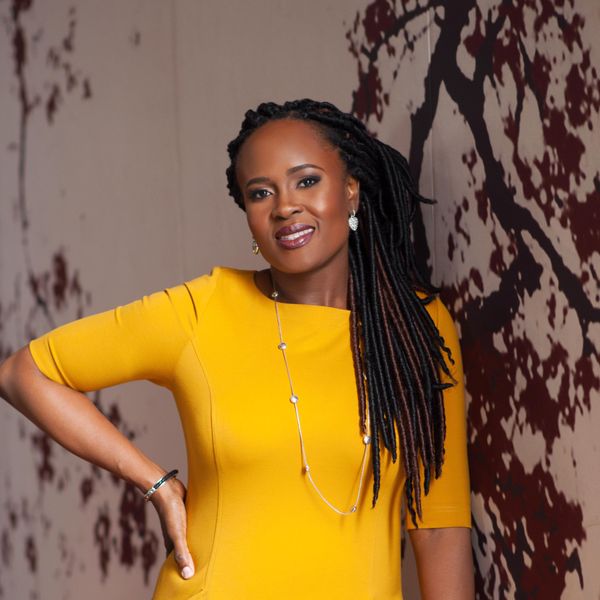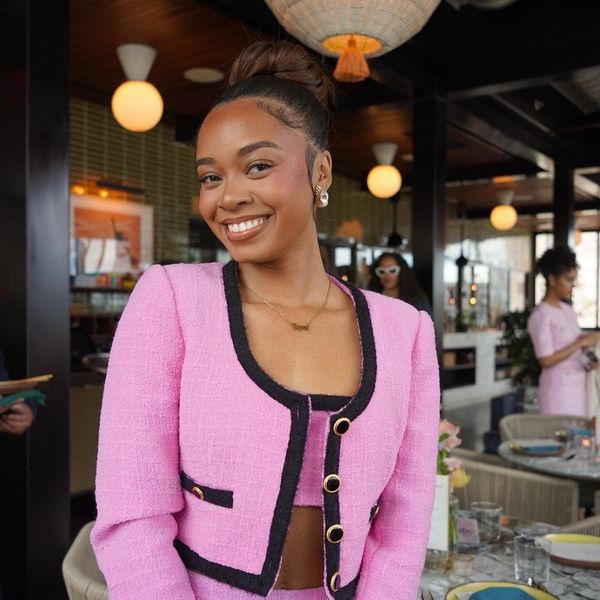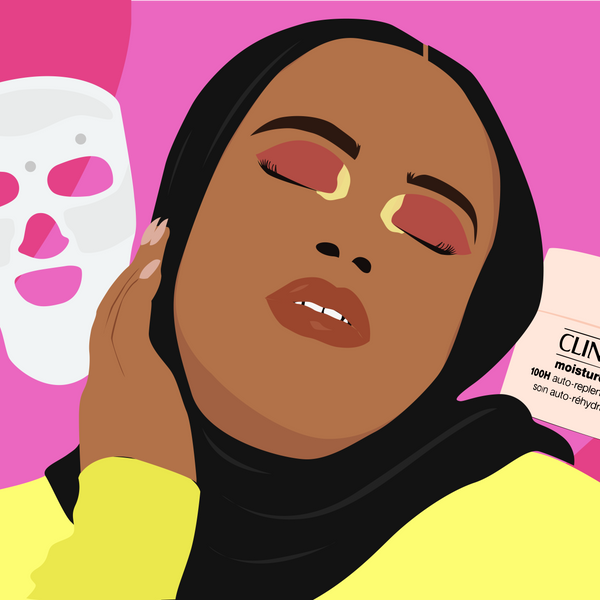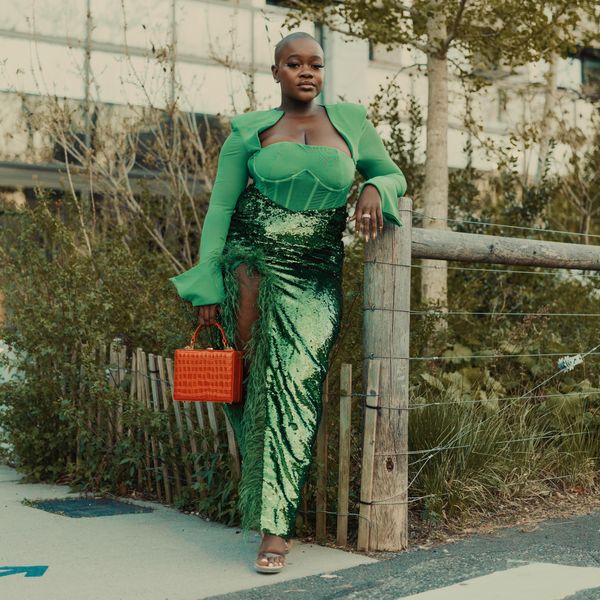
In About Face, xoNecole gets the 411 on IGers who give us #skincaregoals on the daily. Here they break down their beauty routines on the inside and out, as well as the highly coveted products that grace their shelves and their skin.
If there's one thing I've always had a love-hate relationship with, it's my skin. Some days, she wakes up and she's happy, glowing and soft. And other days she's mad as hell and takes it out on me via extra oil production and random breakouts. Luckily for me though, this tumultuous tug of war is something Bolden co-founder Ndidi Obidoa knows all too well. After a day dedicated to some serious fun in the sun turned into a beach day gone bad due to a batch of melanin-averse sunscreen, Obidoa and her beauty partner Chinelo Chidozie were left fed up with the lack of skincare products made for darker-skinned women. Thus, Bolden was born.
Instead of begging brands for products that worked better for melanin-rich skin, they decided to create their own and in an effort to change the dynamic of the industry from within. Since launching, they've created several award-winning products and have become a cult favorite among skincare enthusiasts like Jackie Aina. xoNecole recently got the chance to chat with the 42-year-old Bostonian where she put us on to the importance of having a skincare routine as Black women, the best beauty lesson she's ever learned, and her self-care must-haves. Here's what she had to say...

Courtesy of Ndidi Obidoa
My morning routine consists of...
"Oh gosh, my current COVID morning. I have a six-year-old who I'm homeschooling, so I have to spend like about four-and-a-half to five hours every day with him. My typical morning really starts at 6:30. I try to get an hour workout. I luckily have a treadmill in my house and I have a group of friends where we track our steps daily so I get that out in the morning. I take a shower after that and usually I try to make myself spend five minutes on my face in the morning which is to wash my face for at least a minute, then tone. And then [I] put on my SPF.
"By the time I'm done walking out the shower, I grab coffee, grab like a cup of yogurt. If I have time for breakfast, I grab some and I'm at my desk by 8:30. I work with my son right in front of me while I'm also replying to emails. So it's like back and forth. And by 1-1:30, he's done and out of my office. And then I focus on work."
My AM skincare routine looks like…
"I have my cleanser in the shower. I wash my face. I really try to stick to the rule that we've been sharing with [our Bolden] customers, which is to wash your face for up to one minute. Because that's how long it takes for all the great ingredients we have to work well together. So, I cleanse with the cleanser and when I get out of the shower, I use a brightening toner. It's a product that exfoliates gently and it helps to tighten your pores. I think that's really what has helped me achieve my face. And then next I apply a SPF moisturizer, which I love because it's a 3-in-1 product. It protects your face from the sun. It's a great moisturizer because it keeps your skin soft. And then also it includes Vitamin C. So it helps you manage hyperpigmentation. I do not step out of my house without a SPF moisturizer. I use about four pumps, which might seem like a lot but it adds up very quickly."

Courtesy of Ndidi Obidoa
My evening routine consists of...
"I try to spend some time with my sons. I try to stay with them until they fall asleep. Sometimes we read, sometimes we watch a movie. They really like to cuddle and fall asleep with me, then I have to carry them back into their beds. But I've trained them to go to bed by 8:30 at the latest. I usually try to have dinner with them but if I can't, after 8:30 I'll usually try to have dinner with my husband. We eat and after that I watch Asian drama. I discovered it at the beginning of COVID and it's a whole other world."
My PM skincare routine consists of...
"I repeat the first two steps: the cleanser and toner. And then I just add our nighttime repair serum. I always use mine with a Shea oil because I just like that. People always have this fear that if they apply oils, your skin will get oilier. But that has nothing to do with it. Oil production is controlled by a whole different process, but yeah. And then twice a week in the summer, well like once a week, I use a glow hydrating mask to hydrate. I'll skip one of my nighttime steps and just use the glow mask instead. And that really just keeps my skin well-hydrated."

Courtesy of Ndidi Obidoa
How my skincare routine changes for the seasons...
"Living in Boston, it's cold out here [and] it gets drier in the winter months. What I do is I tend to use more Shea oil in my routine. In the morning, I apply the Shea oil and then do my cleanse after that. My skin gets really dry, like it itches and I have to take Zyrtec sometimes. So it's that kind of dryness, you know? I just use Shea oil and I only use Bolden products. We're actually working on some new cleanser for dry skin. So we hope to launch it by the new year."
My go-to makeup look consists of…
"Since COVID happened, I've only worn makeup once on my birthday. Everyone was calling me, FaceTime-ing me. So I had to try to look a little cuter than normal. But I have a powder that just sort of gives me a little matte look. And then I play up my eyes and my lips. I always have lipstick but I'm still learning how to apply eye makeup because that is really what dramatically changes my look. So it's simple.
"But I no longer have to use foundation, I don't use those big powders. I find that sometimes they really irritate my skin and my skin has gotten so healthy. I tend to use the glow mask before I apply makeup because it just makes my skin supple and beautiful, just like a glow."

Courtesy of Ndidi Obidoa
How I approach beauty from the inside-out...
"I made a commitment when I turned 40, and I revisit it every year, but I really wanted to make exercising my lifestyle--not just something I do to lose weight. I've done bootcamps and stuff. I've even 'wowed' myself with the weight loss. It's just not sustainable, I wanted something that I could do that is sustainable. So I walk, jog for like an hour a day. I really love it. It makes me feel lighter, it just makes me feel good. And I find that I'm less emotional about things that happen to me. And by being less emotional, I feel good. I feel good on the inside, you know? I have less negative thoughts about everything. My mind is clearer and I can make new, fantastic Bolden products."
What self-care looks like to me...
"I love my girlfriends. For my 40th birthday, me and eight of my friends went to Mexico and it was the best time I ever had. They're women who won't lie to me, they're my support system. That's my number one. I also love a bottle of wine. I indulge on weekends, only because I have to wake up early, so I'll try to have a glass then. The other thing is hope! We all have to have something that we're hopeful for, something that we can look forward to. I was also going to say massage, but I haven't had a massage since February. I love massages, I miss it. I was getting them at least once a month until COVID started."

Courtesy of Bolden
My earliest beauty memory...
"I grew up with my single mom. She was a banker, so she had to dress up every day in suits, and wear makeup and go to work. But she was really fastidious about taking off makeup at night, you know, mornings were a little crazy in our household back then. But in the evening, I would just sit by her bedside table and just watch her get rid of her makeup. That's my earliest memory in terms of beauty and skincare and having a routine or something you do every day to care for your skin."
How my views on skincare and beauty have evolved...
"Well, as I've gotten older, I definitely think that in skincare, I understand my skin a lot better than I did in my twenties. I know what my dry skin really is or if it's a little too oily, what things could be affecting the texture of my skin. So now, I just believe that you must have a skincare routine, you should have a routine that you follow every day. People have several routines, I know I have two routines that I go through every week, but you need something basic in good ways to care for your skin. In terms of beauty, now when I look at people and look at the symmetry of their face--it doesn't mean as much like it maybe did when I was younger. Now I think of beauty as the totality of who you are."
For more of Ndidi and Bolden, follow them on Instagram @boldenusa.
All images courtesy of Ndidi and Bolden Beauty.
Writer. Empath. Escapist. Young, gifted, and Black. Shanelle Genai is a proud Southern girl in a serious relationship with celebrity interviews, The Fresh Prince of Bel-Air, and long walks down Sephora aisles. Keep up with her on IG @shanellegenai.
Exclusive: Melanie Fiona On Making High-Vibrational Music & Saying Yes To Partnership
Melanie Fiona is back! After taking a little more than a decade-long hiatus, she has officially made her return to music and blessed us with two singles, “Say Yes” and “I Choose You.” While both singles are very different from each other, they both reflect who she is today and the type of music she wants to make. In our conversation, the mom of two expressed what she learned during her time away.
“It's interesting, even when I said it is like coming back, I don't ever feel like I really left because I was always still performing. I've still been public. It's not like I went into being this recluse person or version of myself, but the thing that I really learned in this process is that I think things take time,” Melanie says in a xoNecole exclusive.
“I think often we're so caught up in it, being on the timing of demand or popularity, or, like, striking while the iron is hot and the thing that I've learned is that everything is on God's time. That's it. Every time I thought I would have been ready, or, like, things were taking too long, I had to reship some things, personally, professionally, in my life. I also gave myself permission to make a living, not just make a living, but make a life for myself.”
Making a life for herself included getting married to Grammy-nominated songwriter Jared Cotter, starting a family, and embracing new landscapes, such as podcasting as a co-host of The Mama’s Den podcast. She also began doing more spiritual work and self-care practices like meditation, sound healing, Reiki, acupuncture, and boundary setting, which allowed her to get in touch with her inner voice.
“I wasn't putting out music, and I wasn't experiencing a number one record, but I was being a number one mom,” she says.
“I was experiencing things that were allowing me to heal and get in touch with myself so that I could make new music from a space of joy and freedom, and excitement again because I definitely feel like I did lose some excitement because of just politics and industry and what it can do to your mental health and even your physical health. So giving myself the space to really just say, ‘Hey, it's okay. Everything's right on time.’”
The joy and excitement are felt in one of two new singles, “I Choose You,” which is more of a lovers rock vibe, a tribute to Melanie’s Caribbean roots. While the Grammy award-winner is known for ballads like “It Kills Me” and “Fool For You,” she is becoming more intentional about the music she makes, calling it high-vibrational music. She says her music is a “reflection of my life,” as it captures every facet, from hanging out with friends to riding around in her car.
“Say Yes” has the classic R&B vibe Melanie is known for. However, both songs are inspired by her relationship. Melanie and Jared got married in December 2020, and the Toronto-bred artist dished on their relationship. Fun fact: he is featured in the “Say Yes” music video.
“When we first started dating, I had come into that relationship post a lot of self-work. I had gotten out of a long-term relationship, I had a year and a half to date and be by myself and do a lot of work on myself alone. And when we met, I remember feeling like this has to be my person because I feel it,” she says.
“And so when we went into that relationship, and we started dating, I was very clear. I was like, I know what I want. I'm very clear on what I need, and I'm not going to withhold my truth about myself in this process because of pride or fear of rejection. I know you love me, but I'm coming with my heart in my hand to let you know that if we're gonna get there, we have to put fear aside and say yes. So that was kind of like my open letter to him, which is why the video is us having a conversation.”
Melanie also shares that saying yes to her partner has empowered her in many ways, including motherhood and showing up for herself. Her new EP, also titled Say Yes, will be available at the top of 2025.
Check out the full interview below.
Let’s make things inbox official! Sign up for the xoNecole newsletter for love, wellness, career, and exclusive content delivered straight to your inbox.
Feature image by Franco Zulueta
Entertaining Like Ayesha Curry: Expert Advice For Holidays Done Right
Be prepared to wow the crowd.
It’s officially the holiday season, which means parties and gatherings galore. Between Friendsgiving, Christmas, and New Year's Eve celebrations, many of us are preparing to host loved ones in our homes one or two times between now and the end of the year. No matter the occasion or season, hosting for family and friends is a labor of love. But we can also agree that entertaining can be overwhelming, especially for first-time hosts.
As a seasoned host and entertainer, Ayesha Curry knows something about creating a memorable event for loved ones. Whether preparing for an intimate dinner with your immediate family or hosting a larger crowd, your guests will think you are a pro this holiday season with her tips on everything from welcoming guests to setting a beautiful table.
Q: What is your top tip for hosting?
Ayesha Curry:Part of being a great host is spending time with your guests, which means you can’t be stuck in the kitchen. Prep is key! I usually serve wine with the meal, but a cocktail or mocktail is a great way to greet guests. I prep the garnish the night before and batch the drink just before guests arrive. When the party begins, I pull everything out of the fridge and am ready to serve.
Writer Note: If you would like to offer non-alcoholic beverages for your sober or sober-curious guests, I love Saint Viviana Cab. It maintains full-body cabernet and flavor; no one will ever guess it’s alcohol-free. You can easily create a signature mocktail using Bittermilk’s Smoked Honey Whiskey Sour mix.
Q: Do you suggest any prep for serving or cooking?
AC:I lay out all my serving dishes and utensils the night before with little post-it notes saying what goes where. That way, I’m not digging around for anything. For more elaborate menus, I lay out quarter sheet pans and label them with tape according to the dish. I prep and measure everything for each recipe and then load each sheet pan with everything needed to make the dish. I wrap each tray in saran or foil, stack them, and place them in the fridge. Pull out the sheet pan you need when cooking, and everything is ready. It’s something I learned at the restaurant that saves so much time.
Q: What’s one item that should always be on a dinner party menu?
AC: Bread or roll with butter is excellent for holding guests over if the kitchen is delayed.
Q: What’s one non-menu item you should always have on hand?
AC: For a non-menu item, wine!
Q: How do you decide on a theme or menu for a gathering?
AC: It all starts with the occasion and the guest list. If it’s a group that doesn’t know each other very well, I may get more elaborate with the theme to help break the ice. For a group of friends or family who don’t get to see each other very often, I usually keep it simple so the evening can be all about catching up. A great playlist, good wine, and a family-style menu are all you need.
Q: Should attendees be expected to bring a gift?
AC: If I’m hosting, I’m not expecting gifts. The gift is taking time to come over and enjoy a meal with me! But bringing something to enjoy at the gathering, like a bottle of wine, is always appreciated.
Q: What are three affordable gifts that guests can give a host?
AC:A bag of excellent coffee is a beautiful gift for a host. Sweet July’s House Blend Coffee is sourced from all-female co-ops, so it’s a gift I love to give to the women in my life. Whether it’s being served after dinner or just for the host to enjoy on their own, you can’t go wrong with a bag of high-end coffee.
Fresh flowers are great if you have a host who likes total control over the food and beverage menu. Go for something neutral in color that can work with any décor.
The Sweet July Olive Oil and Balsamic Vinegar set is my go-to host gift. Bottled in Napa, it’s a gift any foodie will appreciate - and use!
Q: What are some creative tablescape or decor ideas that you love?
AC: I like to keep my dinnerware neutral and classic (like this ceramic collection in nutmeg) and infuse color and texture through linens. For centerpieces, I want to use what I have in my yard. If it’s summer, it might be flowers or greenery, but interesting branches can also look architectural in tall, clear vases next to tapered candles in the colder months. There’s no need to spend a ton of money on flowers.
With Ayesha’s tips, you can create a holiday gathering that your family and friends will cherish forever.
Let’s make things inbox official! Sign up for the xoNecole newsletter for love, wellness, career, and exclusive content delivered straight to your inbox.
Featured image by Getty Images






